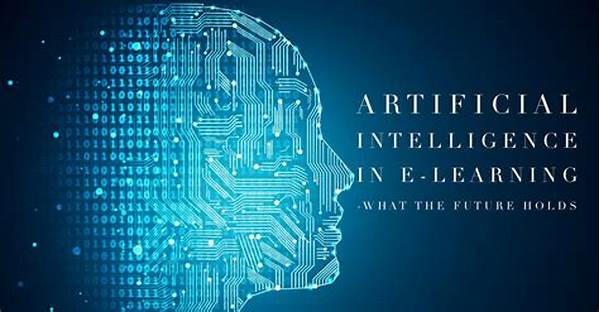The dawn of the digital age has seen rapid technological advancements that continue to reshape various sectors globally. Among these, education has been notably transformed by the integration of artificial intelligence (AI). As we delve into the realm of artificial intelligence in e-learning, it becomes apparent that this symbiosis offers unprecedented opportunities for personalized education, streamlined administrative processes, and enhanced learning experiences. This article will explore various dimensions and implications of AI in the context of electronic learning, outlining its potential to revolutionize conventional educational paradigms.
Read Now : Intensive Online Coding Bootcamp Courses
The Role of Artificial Intelligence in E-Learning
Artificial intelligence in e-learning signifies a pivotal shift from traditional teaching methodologies to more dynamic and personalized strategies. AI technologies facilitate customized learning paths, enabling educational institutions to cater to individual student needs more effectively. By analyzing learning patterns and preferences, AI systems can offer tailored content, ensuring that learners receive the knowledge and skills pertinent to their personal educational goals. Moreover, AI can significantly enhance teacher productivity by automating administrative tasks such as grading and attendance tracking, thereby allowing educators to focus on designing enriching educational experiences. Furthermore, AI-powered tools can analyze vast data sets to predict student performance and intervene when necessary, fostering better learning outcomes and retention rates. In an era where digital learning is becoming increasingly prevalent, artificial intelligence in e-learning is not merely an adjunct to traditional education but a transformative force that ensures equitable access to quality education worldwide.
Applications of Artificial Intelligence in E-Learning
1. Personalized Learning Paths: AI can analyze individual student’s learning habits and preferences, enabling the creation of bespoke educational experiences that effectively cater to each learner’s unique needs.
2. Automated Administrative Tasks: By handling routine tasks like grading and scheduling, artificial intelligence in e-learning allows educators to devote more attention to teaching and curriculum development.
3. Predictive Analytics: AI systems can evaluate student data to anticipate academic outcomes, thus identifying at-risk students and implementing timely interventions to improve performance and retention.
4. Virtual Assistants: AI-powered chatbots can provide students with instant support by answering questions, offering explanations, and facilitating communication between learners and educators.
5. Content Curation: AI technologies can recommend relevant learning materials, resources, and modules, ensuring that students can access the most engaging and appropriate content available.
Challenges of Implementing AI in E-Learning
Despite the promising potential of artificial intelligence in e-learning, the integration of these technologies presents several challenges. Firstly, the implementation of AI requires substantial financial investment in technological infrastructure, which can be a limiting factor for educational institutions with budget constraints. Additionally, data privacy concerns arise as AI systems often rely on the collection and analysis of vast amounts of sensitive student information, necessitating robust data protection measures. Finally, there is the challenge of ensuring that AI tools are ethically designed and free from biases, particularly as AI becomes a more integral part of educational decision-making processes. Addressing these challenges is crucial to harness the full benefits of artificial intelligence in e-learning and to foster an inclusive and equitable educational environment.
Read Now : Frugal Web-based Knowledge Resources
Benefits of Artificial Intelligence in E-Learning
Artificial intelligence in e-learning brings numerous advantages that stand to reshape the educational experience. Firstly, AI-driven personalization provides students with customized learning journeys, improving engagement and retention. Secondly, enhanced accessibility ensures that learners from diverse backgrounds, including those with disabilities, receive education that suits their individual needs. Furthermore, AI mechanisms reduce the administrative burden on educators by automating repetitive tasks, thereby allowing them to concentrate on pedagogy and student engagement. Data-driven insights from AI-generated analytics enable educational institutions to make informed decisions about curriculum design and student support services. These benefits collectively contribute to an enriched and equitable learning environment.
Ethical Considerations in Artificial Intelligence for E-Learning
When discussing artificial intelligence in e-learning, ethical considerations are of paramount importance. It is crucial to ensure that AI systems maintain transparency, avoiding biases that could potentially disadvantage certain student groups. Accountability in AI deployment is essential, with clear guidelines and oversight mechanisms to prevent misuse. Data privacy is another significant concern; thus, safeguarding student information from unauthorized access and ensuring compliance with data protection regulations is indispensable. Furthermore, educators must be adequately trained to use AI tools ethically and effectively, ensuring that technology complements human expertise rather than replacing it entirely. Ensuring these ethical standards fosters trust and confidence in AI-driven educational environments.
Future Prospects of Artificial Intelligence in E-Learning
As we look toward the future, artificial intelligence in e-learning is poised to continue its transformative journey. Advances in natural language processing and machine learning algorithms will likely enhance the capabilities of AI-driven educational tools, further personalizing the learning experience. Virtual reality and augmented reality, powered by AI, may become more prevalent, providing immersive and interactive learning environments. The challenges related to equity, accessibility, and ethical considerations will need addressing to ensure inclusive access and the responsible use of AI technologies in education. Ultimately, AI has the potential to democratize education, offering every learner the opportunity to achieve their full potential through intelligent, interactive, and individualized learning experiences.
Conclusion
In summation, the integration of artificial intelligence in e-learning represents a significant evolution in the educational landscape. This technological symbiosis not only enhances the quality and accessibility of education but also offers solutions to longstanding challenges within the traditional educational framework. However, it is imperative to approach this integration thoughtfully, addressing potential ethical concerns and ensuring the highest standards of data security and equity. By harnessing the benefits of AI, educators and policymakers can revolutionize learning methodologies, paving the way for a future where education is more personalized, accessible, and effective. This new era of learning promises to empower students globally and to contribute meaningfully to society’s development and progress.
